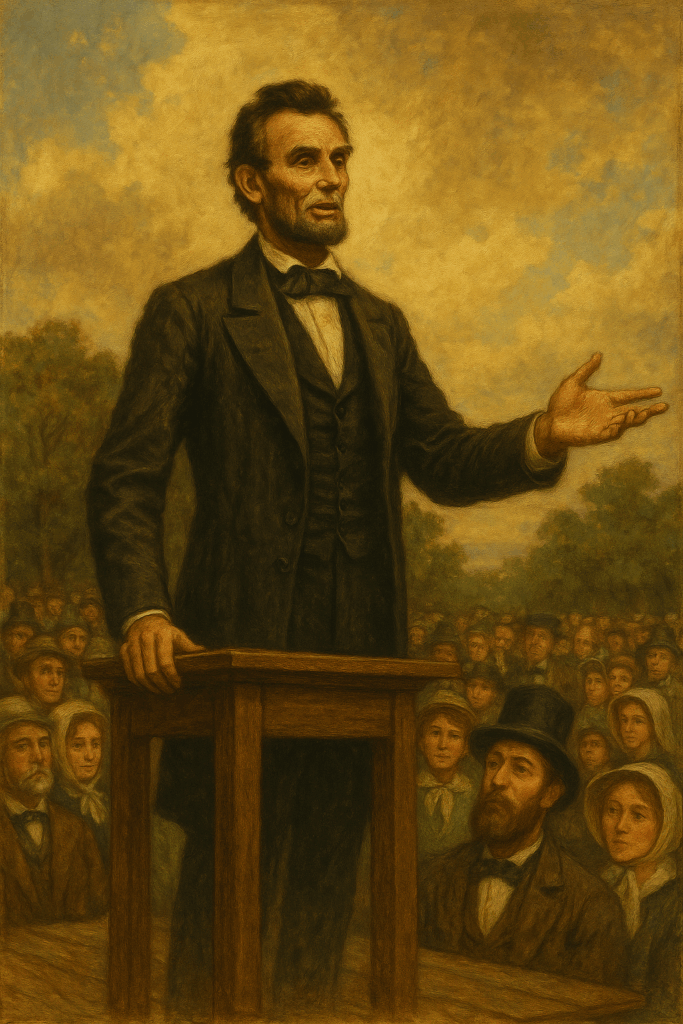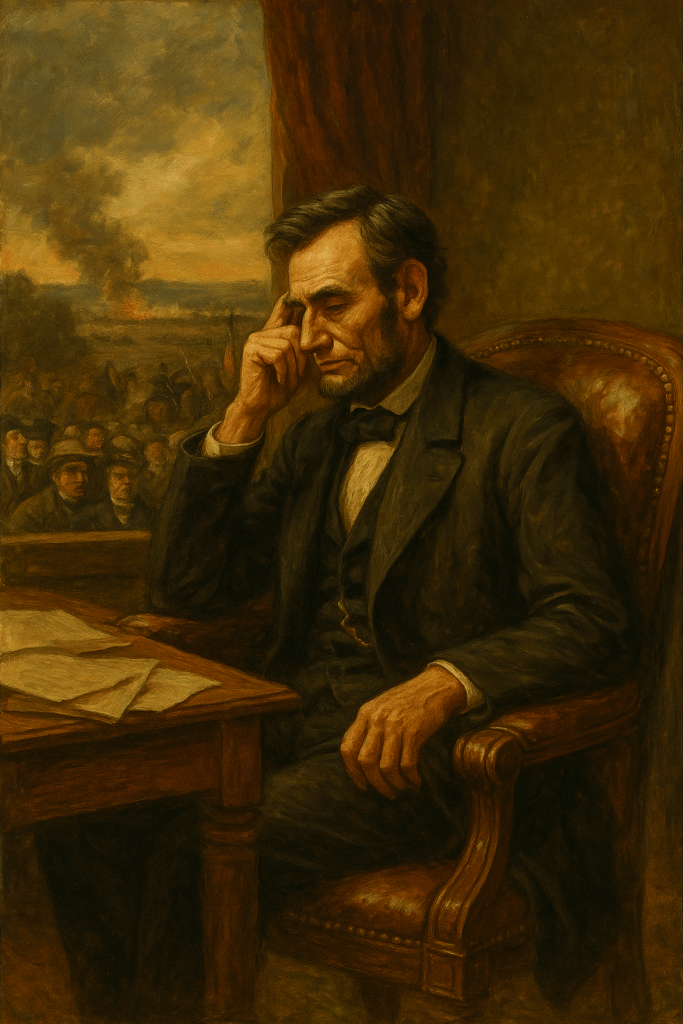
INTP
Abraham Lincoln, one of America’s most iconic presidents, is often associated with the INTP personality type. Known for their analytical minds, creativity, and love of ideas, INTPs thrive in exploring possibilities and questioning assumptions. Lincoln’s legacy of thoughtful leadership and careful reasoning highlights many of the same qualities that define INTPs.
Rather than leading with bold charisma or showmanship, Lincoln leaned on his ability to think deeply, weigh ideas, and find solutions to seemingly impossible problems. His ability to remain calm and reflective during turbulent times reflects the INTP approach to life: quietly dissecting complexities before acting with clarity.
Abraham Lincoln’s INTP Legacy in Historic Speech

This depiction of Abraham Lincoln giving a speech captures both the atmosphere of the 19th century and the essence of his INTP personality type. Standing tall at a podium, Lincoln addresses a crowd dressed in period clothing, his thoughtful presence commanding attention. The scene highlights his role not just as a leader, but as a thinker whose quiet analysis shaped the course of history.
Lincoln’s INTP traits shine in the way he approached leadership — with deep reasoning, careful reflection, and a focus on ideas rather than theatrics. His speeches, from the Gettysburg Address to his second inaugural, demonstrate the INTP gift for distilling complex issues into concise, powerful insight. The historic setting mirrors Lincoln’s reliance on principle and logic during times of uncertainty, qualities that remain as relevant today as they were during the Civil War.
For admirers of Lincoln and students of personality psychology, this image is a reminder of how the INTP mind — curious, analytical, and visionary — can leave a lasting mark on history.
Abraham Lincoln INTP – A Leader in Deep Reflection

This powerful depiction of Abraham Lincoln shows him in a rare moment of quiet contemplation, reflecting the qualities of his INTP personality type. Seated at his desk with papers in front of him and a stormy horizon outside, Lincoln appears burdened by the immense responsibility of leadership during the Civil War. The thoughtful pose highlights his reliance on analysis, logic, and vision — hallmarks of the INTP mind.
Lincoln’s Introverted Thinking (Ti) helped him break down complex issues into clear solutions, while his Extraverted Intuition (Ne) allowed him to envision multiple paths forward during a divided time in history. His ability to reflect deeply before acting shows why his leadership remains timeless. The contrast between the quiet study and the chaos outside the window symbolizes the tension between inner thought and external turmoil that Lincoln navigated throughout his presidency.
For admirers of history and personality psychology, this image underscores how Lincoln’s INTP nature shaped not just his decisions, but also his legacy as a leader who guided a nation through its darkest hour.
Interesting Facts Linked to Personality Type
- Deep thinker: Lincoln often retreated into thought, spending hours reading and reflecting — a natural INTP habit.
- Inventor at heart: He remains the only U.S. president to hold a patent, showing the inventive spark of INTP creativity.
- Love of learning: Lincoln was largely self-taught, demonstrating the INTP hunger for knowledge.
- Complex writer: His speeches, including the Gettysburg Address, reflect the INTP gift for concise yet powerful ideas.
How INTP Traits Shaped Lincoln’s Leadership
Lincoln’s INTP side shone brightest in his ability to approach problems logically yet with imagination. His dominant Introverted Thinking (Ti) gave him the clarity to analyze complicated political issues, while his Extraverted Intuition (Ne) helped him see multiple possibilities for resolving conflict. Together, these traits fueled his ability to navigate the Civil War with patience and vision.
His Introverted Sensing (Si) grounded him in history and tradition, helping him frame decisions within a broader context, while his Extraverted Feeling (Fe) allowed him to connect with the public through empathy and carefully chosen words. This rare balance of logic and empathy is what made Lincoln’s leadership so enduring.
Lessons Fans and Leaders Can Learn from Lincoln
- Think before you act: Lincoln’s reflective style shows the power of deep analysis.
- Stay open to possibilities: INTPs like Lincoln remind us to explore many angles before making decisions.
- Value knowledge: Lifelong learning can become a source of strength in leadership.
- Balance reason with empathy: True influence comes from blending logic with understanding people’s needs.
Famous Quotes
“Give me six hours to chop down a tree and I will spend the first four sharpening the axe.”
This reflects the INTP value of preparation, analysis, and efficiency before action.
“Those who deny freedom to others deserve it not for themselves.”
Here Lincoln demonstrates the INTP’s ability to translate deep reasoning into moral clarity and timeless principles.




